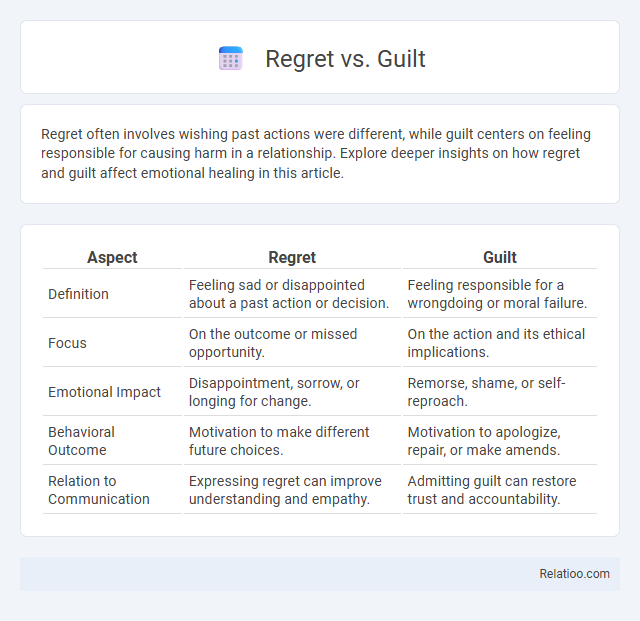Regret often involves wishing past actions were different, while guilt centers on feeling responsible for causing harm in a relationship. Explore deeper insights on how regret and guilt affect emotional healing in this article.
Table of Comparison
| Aspect | Regret | Guilt |
|---|---|---|
| Definition | Feeling sad or disappointed about a past action or decision. | Feeling responsible for a wrongdoing or moral failure. |
| Focus | On the outcome or missed opportunity. | On the action and its ethical implications. |
| Emotional Impact | Disappointment, sorrow, or longing for change. | Remorse, shame, or self-reproach. |
| Behavioral Outcome | Motivation to make different future choices. | Motivation to apologize, repair, or make amends. |
| Relation to Communication | Expressing regret can improve understanding and empathy. | Admitting guilt can restore trust and accountability. |
Understanding Regret and Guilt: Core Definitions
Regret refers to the emotional response experienced when reflecting on past actions or decisions perceived as mistakes or missed opportunities, emphasizing a wish to change the outcome. Guilt, by contrast, involves a feeling of responsibility or remorse for a specific wrongdoing, often related to moral or ethical standards. Understanding the core definitions of regret and guilt highlights their distinctions: regret centers on self-directed disappointment about choices, while guilt implicates a sense of accountability for harm caused to others.
Psychological Roots: How Regret and Guilt Develop
Regret arises from reflecting on past decisions that led to unfavorable outcomes, rooted in the desire to undo or change actions, while guilt stems from recognizing that one's behavior violated personal or societal moral standards. Both emotions develop through cognitive processes involving self-evaluation and moral judgment, but guilt is more strongly tied to feelings of responsibility and empathy toward others. Understanding the psychological roots involves examining how individuals internalize experiences of wrongdoing and the cognitive mechanisms that differentiate self-blame from remorse over consequences.
Key Differences Between Regret and Guilt
Regret involves feeling sorrow for past actions or missed opportunities, while guilt specifically relates to a sense of responsibility for causing harm or wrongdoing. You experience regret when wishing you had acted differently, but guilt arises from moral judgment and accountability. Understanding these key differences helps in addressing your emotions more effectively and fostering personal growth.
Emotional Impact of Regret vs Guilt
Regret and guilt both involve negative emotions tied to past actions, but regret centers on wishing one had made different choices, leading to feelings of sorrow and disappointment. Guilt arises from a sense of responsibility for harm caused to others, often accompanied by remorse and a desire to make amends. Your emotional experience with regret tends to focus more on missed opportunities and personal loss, while guilt profoundly impacts your self-concept due to ethical or moral implications.
Regret and Guilt in Decision-Making Processes
Regret and guilt both influence decision-making by shaping emotional responses to past actions, but they differ in focus: regret centers on unfavorable outcomes from choices made, while guilt arises from moral or ethical violations perceived by the individual. Decision-making processes are impacted by these emotions as regret often leads to reconsideration of options to avoid repeating mistakes, whereas guilt may motivate reparative actions to restore moral balance. Understanding the distinction between regret and guilt helps in developing strategies for better emotional regulation and improving future decision outcomes.
Common Triggers for Regret and Guilt
Regret and guilt often stem from personal decisions that lead to unfavorable outcomes or harm to others, with common triggers including missed opportunities, poor choices, and moral transgressions. Regret typically arises when you feel sorrow for actions not taken or mistakes made, while guilt is strongly tied to a sense of responsibility for causing harm or violating ethical standards. Recognizing these triggers can help you address and manage your emotional responses more effectively, fostering personal growth and emotional resilience.
Coping Strategies for Regret and Guilt
Coping with regret involves reflecting on past decisions to identify lessons and make positive changes, often through mindfulness practices and goal-setting to foster personal growth. Managing guilt requires acknowledging responsibility, seeking forgiveness, and engaging in self-compassion exercises to alleviate negative self-judgment. Both emotions benefit from cognitive-behavioral techniques that reframe thoughts, promote acceptance, and encourage proactive behaviors to enhance emotional resilience.
Long-term Effects on Mental Health
Regret often leads to persistent rumination, which can exacerbate anxiety and depression over time, while guilt tends to trigger self-reflection and accountability, potentially promoting emotional growth if managed healthily. Long-term unresolved regret may result in chronic stress and diminished well-being, whereas excessive guilt can contribute to feelings of worthlessness and exacerbate mental health disorders such as obsessive-compulsive disorder. Differentiating between these emotions is crucial for effective therapeutic interventions that enhance resilience and foster psychological healing.
Transforming Regret and Guilt into Positive Change
Regret and guilt both stem from recognizing past mistakes but differ in focus: regret centers on actions taken or not taken, while guilt involves a moral responsibility for causing harm. Transforming these emotions into positive change requires self-reflection and constructive actions, such as setting clear goals and learning new behaviors to prevent recurrence. Embracing this process enhances emotional resilience and promotes personal growth by turning negative feelings into motivation for improvement.
When to Seek Help: Addressing Persistent Regret and Guilt
Persistent regret and guilt can significantly impact your mental health, leading to anxiety, depression, and impaired decision-making. When negative feelings of regret or guilt persist beyond a reasonable timeframe or interfere with daily functioning, it is crucial to seek professional help such as therapy or counseling. Addressing these emotions early through cognitive-behavioral techniques or mindfulness practices can prevent long-term psychological distress and promote emotional resilience.

Infographic: Regret vs Guilt
 relatioo.com
relatioo.com